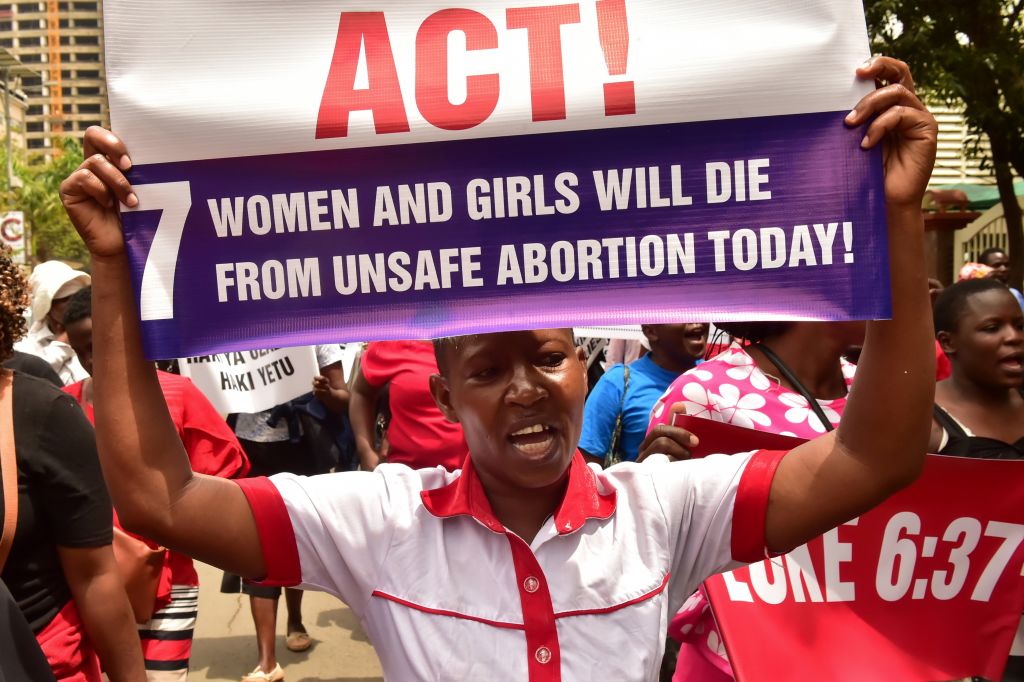A U.S. policy banning government-funded aid groups from discussing abortion around the world has led to deaths from botched procedures and cut care to HIV-infected orphans and other children, researchers said on Wednesday.

Non-governmental organizations working outside the United States must choose between accepting the ban imposed by President Donald Trump two years ago or rejecting it and losing U.S. funding under what critics have termed a “global gag rule”.
READ MORE: Canada, Netherlands exploring global safe abortion fund to counter Trump (2017)
Since then, two women have died in Kenya from unsafe abortions after a group that serves sex workers stopped providing abortion information and referrals, according to a report by the International Women’s Health Coalition (IWHC).
One had tried to induce an abortion with a knitting needle, it said.
Initially started in 1984, the gag rule policy has been imposed by Republican presidents like Trump and revoked by Democratic presidents.
The policy has led to unwanted pregnancies, unsafe abortions and preventable deaths, said Francoise Girard, IWHC president.
“This deadly policy violates the rights of patients and ties the hands of providers,” she said in a statement.
READ MORE: Trudeau: a woman’s right to make choices about her own body is being thrown into question

The research, which looked at the policy’s impact in Kenya, Nepal, Nigeria and South Africa, was released at Women Deliver, a global conference on gender equality held every three years.
It came after the United States recently expanded the policy and several U.S. states passed new limits on abortion, seen as possible legal avenues for the U.S. Supreme Court to review the nation’s law permitting the procedure.
Almost $9 billion in U.S. foreign aid is at stake under the policy, which has been used by U.S. presidents to signal their stance on abortion rights, a touchstone issue in U.S. politics.
Trump, positioning himself as an abortion opponent, signed it on his fourth day in office in January 2017.

Beyond the impact on the availability of safe abortions, the rule has forced the closing of clinics and outreach programs that provide an array of health care services, the report said.
An organization in Kenya that cared for HIV and AIDS patients lost its funding and had to cut services and care for 13,000 orphans and children with HIV, the report said.
“Who would be against providing orphans and vulnerable children with education and health services? It’s going that far,” Vanessa Rios, author of the report, said to the Thomson Reuters Foundation.
Previous studies estimated up to 26 million women and families would lose access to contraceptive services under the policy.
A spokeswoman for the U.S. Agency for International Development (USAID), which administers aid, said the government was making sure it did not fund groups that “perform or actively promote abortion as a method of family planning”.
Most of the groups that receive U.S. government aid have agreed to the policy’s conditions, she said.
“The United States remains committed to helping women and their children thrive, particularly in countries where the need is greatest,” the USAID spokeswoman said.
READ MORE: Nearly half of abortions in the world are unsafe: WHO
Women lawmakers in the U.S. Congress recently took steps to lift the ban, introducing legislation that would permanently shut down the controversial policy.
Under Trump, the policy was expanded to funding for all global health assistance, including programs for HIV, tuberculosis, malaria and immunizations.
More recently, the U.S. State Department said the policy would be expanded further by cracking down on aid groups that fund other groups that support abortion.



Comments